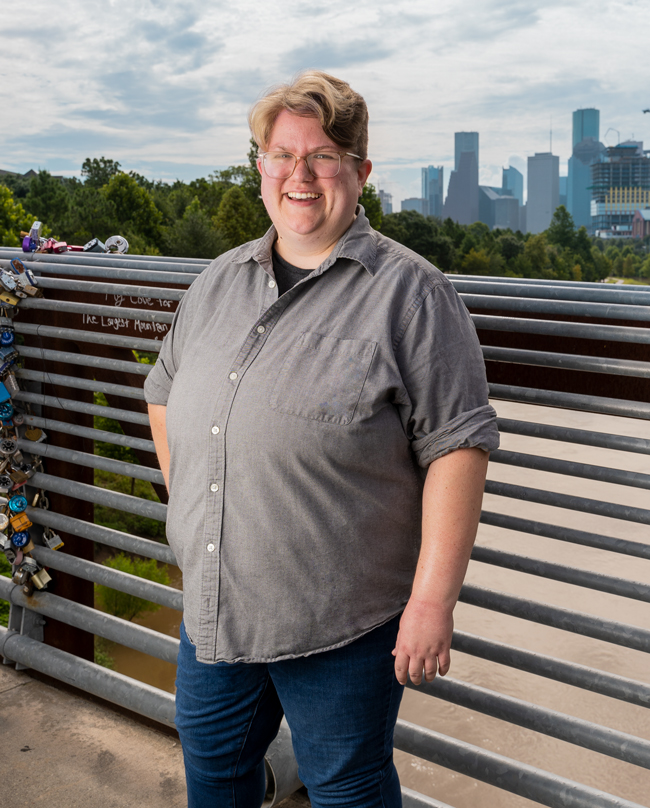
Advocate in Academia
UH LGBTQ Resource Center’s Juliann Losey helps students understand intersections of identity.

Growing up in Alabama, Juliann Losey, 32, always leaned toward more masculine qualities, and as often happens, they didn’t quite understand the complexities of gender or identity. After all, how does one identify when there isn’t quite a language to express it, or a science to explain how one feels internally?
“In my days as a younger queer person, I ended up finding a lot of community with trans men, and I really connected with some of their stories of their gender and exploring masculinity. Once I accepted and embraced that side of myself, I was a much happier, healthier person,” Losey says. “My [identifying initials] have evolved over the years. I currently identify as nonbinary and queer. Some of what I love about that is that those identities give me some freedom to be playful. I’m not super-rigid in those identities. I have always enjoyed being playful with my gender expression. Once I started meeting other nonbinary people and learned what that was a few years ago, I realized that’s what I’ve been experiencing this entire time. And now I have language for it.”
After earning a bachelor’s degree in professional writing from the University of North Alabama and a master’s degree in leadership and ethics from Spring Hill College, they stayed in the higher-education field—where all of that experience with questioning identity and sexuality was put to good use.
“The ultimate goal for my work is always to create a space for students who need it the most so they can feel safe, find friends, build community, and get connected with resources of support if they need it.”
“I have been thinking about gender since I was a little kid. I was raised in a conservative part of Alabama, but I knew I had a connection with masculinity. My dad was pretty supportive of me—he wanted me to be a ‘tomboy,’ as he puts it. He was somewhat supportive of that expression, and because of that, I’ve been very aware of gender. The way it impacted me is I have started to think of gender as something that is nuanced for everyone. Whether someone is cisgender or transgender or binary or nonbinary, it’s connected to our identity just like race, religion, or region. We make interpretations about what we think of our gender internally, and it comes together to form our very complicated identity with gender. I often get asked to explain my identity, so that practice has become, in an informal way, helpful for me to navigate those conversations [in my job],” they explain.
Losey spent 10 years working in campus student-affairs programming. During that time, they worked with identity and leadership development, social justice and, in particular, gender and sexuality topics. They have developed experiential programs for students around the history of gender, and how intersectionality and culture can affect a person’s views about gender. They have also presented talks on LGBTQQIA identities and how to treat people with dignity and respect.
“Up until now, I have worked in residence-life settings on campus. A lot of times, I’ve been the only nonbinary person or queer person on staff or in the Division of Student Affairs. Being the only person means students seek you out more often. Sometimes they’re struggling with their own identities, or they need to have a tough conversation to figure out LGBTQ issues. I like putting myself in the place to have conversations with those folks,” Losey adds.
“I’ve been the first person that some people have come out to, and it’s such a privilege to be that person and to be a safe space for folks. It’s also certainly challenging sometimes when you’re the token nonbinary person, because it also carries the weight of taking on the education of your peers who sometimes don’t understand why pronouns matter. I’d rather be the person doing that explaining, [rather than forcing a new freshman] to explain themselves in a system where they might feel powerless,” they say.
Losey is now the University of Houston’s Gender and Sexuality Education Program Manager in the school’s LGBTQ Resource Center. Their previous experience meshes perfectly with the new tasks they will undertake. In their current role, Losey will oversee the LGBTQ+ ambassador/leadership program, bring in campus-wide speakers to expand LGBTQ+ awareness, as well as conduct gender and sexuality workshops to engage with students on a variety of issues relating to identity, inclusion, and allyship.
“The ultimate goal for my work is always to create a space for students who need it the most so they can feel safe, find friends, build community, and get connected with resources of support if they need it,” they emphasize. “My dream goal is to help find ways to give others the space to do that same thing. The LGBTQ Resource Center is the place we wanted to create for LGBTQ students, but I’d also love to make other spaces as LGBTQ-friendly as possible.”
Understandably, Losey’s job will sometimes be a tough one. But the thing that helps them get through trying times is a sense of humor. They have been taking virtual classes with Chicago’s famed comedy school, The Second City.
“Sometimes I end up in environments where folks, including myself, take things too seriously. The humor helps us to lighten it up and remember that we’re human and we’re having fun. I really love making people laugh. It’s one of my favorite things. Any time we can lighten the mood and have a good time with what we’re doing, it makes people happier, in general. I think it helps others get more comfortable to open up as well.”
For information about the UH LGBTQ Resource Center, visit uh.edu/lgbtq.
This article appears in the August 2021 edition of OutSmart magazine.










